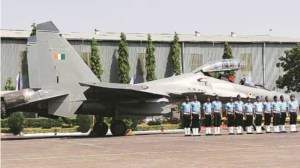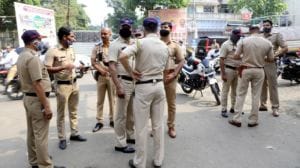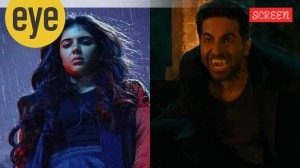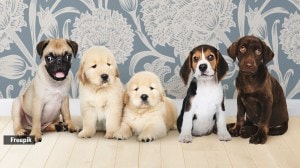Triumphant Bush redirects forces to Al Qaeda
In declaring military victory over Iraq on Thursday night, President Bush made a strong effort to direct Americans’ attention away from...

In declaring military victory over Iraq on Thursday night, President Bush made a strong effort to direct Americans’ attention away from the aftermath of Saddam Hussein’s fall and back toward the ongoing campaign against Al Qaeda.
Until Thursday, the White House had postponed a presidential speech declaring victory because of the messy uncertainty that remains on the ground in Iraq. There have been no confirmed findings of chemical, biological or nuclear weapons. Saddam and most of his top leadership remain unaccounted for. And celebrations among liberated Iraqis have turned into anti-American protests as the country’s disparate groups begin to feud.
|
Sergeant accused of
attack says he was harassed |
| WASHINGTON: A US sergeant accused of setting off three grenades in a tent in Kuwait that killed two officers and wounded 14 soldiers told his mother that he was humiliated about his Islamic faith by three superior officers. Asan Akbar said fellow soldiers often called him a ‘‘raghead.’’ He claimed that he was ‘‘provoked and harassed’’ and felt as though he was the enemy rather than a US soldier. ‘‘If they hadn’t done that, and said what they said, this would never have happened,’’ his mother, Quran Bilal, said on Thursday. (LAT-WP) |
On Thursday night, however, Bush set such concerns aside. He made just a glancing reference to those problems in his address to cheering sailors aboard the USS Abraham Lincoln off California; the remaining questions in Iraq received just 140 words in an 1,800 word speech.
Instead, Bush demoted the war in Iraq, and the earlier war in Afghanistan, to mere ‘‘battles’’ in the larger war on terrorism — and he rested much of his address on the disputed premise that Saddam’s Iraq was allied with Osama bin Laden’s Al Qaeda. Bush’s address on was also designed to celebrate — and take some credit for — the one claim on which there can be no doubt: the military triumph of the troops who, as the President said: ‘‘Have shown the world the skill and might of the American armed forces.’’
For Bush — who also spent the night aboard the carrier — the whole day was devoted to linking his presidency to the aura of the US military. When the Viking S-3B carrying Bush made its tailhook landing on the aircraft carrier off California, Bush emerged from the cockpit in full olive flight suit and combat boots, his helmet tucked jauntily under his left arm.
The ship, often called the largest vehicle on the planet, is a symbol of might (the White House issued a fact sheet noting that its sailors had consumed 29,000 pounds of hamburger on their voyage). Its name, the Abraham Lincoln, symbolises emancipation and freedom. And its triumphant homecoming from the Iraq war provided Bush with the perfect opportunity to highlight the success by — literally — embedding himself with the troops for a night.
Making his way to the Lincoln aboard a jet that can carry up to 3,958 pounds of missiles, torpedoes, rockets and bombs, the victorious commander-in-chief recalled his days in the Guard with fondness. ‘‘I miss flying, I can tell you that,’’ he said, telling reporters he was at the controls for a third of his flight to the carrier from the coast, which at times through the day was visible from the Lincoln.
Later, wearing a life-vest with ‘‘Commander in Chief’’ on the back and a helmet, he moved along the deck, flashing a thumbs up and shaking hands with sailors. (LAT-WP)






- 01
- 02
- 03
- 04
- 05

























